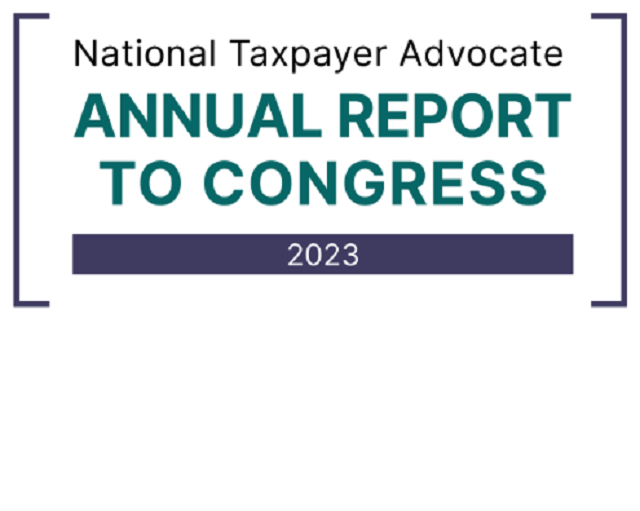A new report by the National Taxpayer Advocate outlines the ten “most serious problems” encountered by taxpayers dealing with the IRS.
The report paints a picture of an IRS rebounding after 3 tough years post pandemic and back to normal “baseline” However, their normal baseline of operations is no longer good enough. The report states that overall, the successes outweigh the weaknesses of 2023 - but from such a low baseline that it was a pretty easy accomplishment.
The ten issues (items in quotation marks are from the Taxpayer Advocate report):
Processing. The IRS’s job starts with processing tax returns. This has been a critical failure. This covers dealing with tax returns and related correspondence and adjustments. The Taxpayer Advocate Service (TAS) identifies four areas with extreme backlogs:
- Processing of amended returns;
- Processing of correspondence and AM cases;
- Processing of paper returns; and
- Resolution of returns suspended in the processing stream
To name a few specific problems, a majority of our resolution cases consist of us contacting the IRS about processing errors. These include tracking down amended returns filed over 2 years ago with missing refunds. Correcting post-mark mailing dates in which the IRS wrongly rejects claims for refunds. Paper returns that were incorrectly transcribed in the system, and “unpostable” returns for various reasons.
Hiring, Recruitment, Training. “Insufficient staffing has caused the quality of taxpayer service to decline on telephone lines and at Taxpayer Assistance Centers and significant IRS processing delays to arise. Even when the IRS can recruit enough staff, it struggles to attract, onboard, retain, and train the talent it needs because of “[i]neffective and outdated policies, technologies and processes.”
IRS Transparency. “The IRS Still Does Not Provide Sufficient Clear and Timely Information to the Public, Causing Confusion and Frustration and Complicating Agency Oversight”
Telephone & In-person Service. Phone service increased from 11% of answered calls to 29%, according to the report. This “Level of Service” metric provides an overly-rosy picture of IRS phone service. It’s still very difficult to reach the IRS via phone call and even harder to schedule an in-person meeting. If you do manage to speak with a representative on the phone more of them are new and are providing poor and inaccurate information, frustrating professionals and taxpayers.
Many of our phone calls to the IRS take 2 or 3 attempts for resolution. Even when we get through to a representative the calls are disconnected or the representatives provide us incorrect information. Power of attorneys are often not on file and fax issues with trying to transmit the 2848 creates more issues which otherwise should be a seamless process.
Return Preparer Oversight. “Because taxpayers bear responsibility for the accuracy of their own returns, inept or dishonest preparers harm taxpayers by subjecting them to unanticipated tax deficiencies, interest, overpaid taxes, or lost refunds.”
Identity Theft. “Individuals who are victims of tax-related identity theft are waiting an average of nearly 19 months for the IRS to process their returns and send their refunds. Yes, you read that correctly: for many victims, that’s more than a year and a half! “
Online Account Access for Taxpayers and Professionals. “Digital Services Remain Inadequate, Impeding Efficient Case Resolution and Forcing Millions of Taxpayers to Call or Send Correspondence to the IRS.”
For comparison, when was the last time you had to mail a letter to, say, your bank or credit card company, or to Amazon, to resolve a question?
International. “The IRS’s Approach to International Information Return Penalties Is Draconian and Inefficient… The majority of these penalties are automatically assessed, broadly applied, needlessly harsh, and often unexpected.”
Compliance Challenges for Taxpayers Abroad. “Taxpayers abroad may face severe penalties if they fail to file forms, some of which they may not even be aware. The complexity of the tax code, the inability to easily comply, and the fear of severe penalties are so great that some taxpayers choose to relinquish their U.S. citizenship.”
Eide Bailly’s Global Mobility Services team spends its days helping taxpayers negotiate these issues.
Appeals. “The lack of independence and operational efficiency in the IRS Independent Office of Appeals (Appeals) process undermines taxpayer trust and prolongs dispute resolution. When taxpayers are unable to resolve their issue in Appeals or question the impartiality of Appeals, they may opt for costly litigation instead, adding financial and emotional strain.”
Appeals cases are conducted by ex-revenue agents who have determined that appeals is a career path change and promotion that the IRS. This leaves us struggling with independence issues and trying to convince appeals officers that the case is not to be “re-examined” but settled based on appeals standards and hazards of litigation.
Bottom line: The IRS is making progress from a bad place. It will take a lot more progress for the agency to get to a good place.
We're Here to Help



